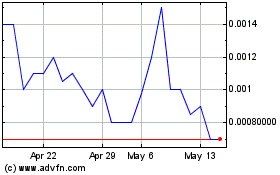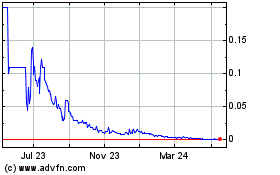Propanc Demonstrates Significant Anti-Tumor Efficacy in Pancreatic and Ovarian Cancer Preclinical Models; Files Patent Specif...
18 November 2015 - 12:30AM
Access Wire
MELBOURNE, AUSTRALIA / ACCESSWIRE / November 17, 2015
/ Propanc Health Group Corporation (OTCQB: PPCH)
("Propanc" or "the Company"), an emerging healthcare company
focusing on development of new and proprietary treatments for
cancer patients suffering from pancreatic and colorectal cancers,
today announced the Company has achieved significant tumor growth
inhibition in pancreatic and ovarian cancers for PRP in recent
preclinical animal efficacy studies. The results from these studies
were also used to file a new patent specifying a new target
efficacious dose range for future human studies.
"We are thrilled with the results and believe it now paves the
way for scientific advice meetings with regulatory agencies to
determine the development pathway for human studies," said James
Nathanielsz, Propanc's Chief Executive Officer, "As a result of
achieving this significant milestone, we are convinced PRP, which
is a combination of two proenzymes, trypsinogen and
chymotrypsinogen, could become a breakthrough treatment in the
fight against aggressive tumors like pancreatic and ovarian
cancers. In fact, most common solid tumors."
In the pancreatic cancer study, Pan-02 mouse pancreatic tumor
cells were orthotopically inoculated (i.e. grafted into its normal
place in the body) into immune competent (C57BL/6) mice.Treatment
with PRP injected once daily commenced nine days post inoculation,
identified as Day 0. At Day 26, significant (p≤0.05) reduction in
mean tumor weight was observed, 86% inhibition at the efficacious
dose compared to the vehicle control.
In the ovarian cancer study, A2780 human ovarian cancer cells
were orthotopically inoculated in female, immune compromised
(athymic Nude-Foxn1(NU)) mice. Treatment with PRP
injected once daily commenced seven days post inoculation,
identified as Day 0. At Day 21, significant (p≤0.05) reduction in
mean tumor weight was observed, 54% at the highest efficacious dose
identified, and 48% at the lowest efficacious dose. Furthermore,
several mice in both treatment groups appear to have no tumor
present upon final examination. This is despite identifying tumors
in all mice in the experimental control groups.
Further, all mice in the treatment groups exhibited no serious
adverse clinical signs in both studies.
Photographs of excised tumors taken from mice on the final day
of each study to assess anti-tumor efficacy of PRP are shown
below.
"The results from these preclinical studies are conclusive that
PRP is effective in these tumor models," said Dr. Julian Kenyon,
Propanc’s Chief Scientific Officer. "What is even more interesting,
it appears that tumor models with immune functioning mice show
markedly increased inhibitory effects, which could possibly be
attributed to the immunobiological effects of PRP, basically
enhancing the immune response to assist with tumor regression. As a
result of this fine work undertaken with our preclinical research
partners, we have identified an efficacious dose range which we can
now use to target in human studies."
Based on the results from the data, the Company has filed a new
patent application specifying novel proenzyme compositions at
different dose ranges, which could be used to treat cancer. This is
in addition to its lead patent, which has commenced entering the
national phase level in individual countries and regions, globally,
and is granted in Australia, South Africa and New Zealand.
Professor Klaus Kutz, Propanc's Chief Medical Officer, said,
"Now that we have proven scientific evidence in animals, which
supports my evaluation of a number of patients who significantly
exceeded their life expectancy after being treated with proenzymes
for compassionate use by Dr. Kenyon, we are ready to prepare the
next phase of our program for formal preclinical and clinical
development of PRP. Given the correlation between cellular, animal
and human data, it is likely we will pursue pancreatic cancer as
our primary target indication. Cancer types like pancreatic and
ovarian cancers could potentially qualify for orphan drug
designation given the size of these patient populations, which we
are keen to explore."
About Propanc:
Propanc is currently focused on developing new cancer treatments
for patients suffering from pancreatic and colorectal cancers. We
have developed a formulation of anti-cancer compounds which exert a
number of effects designed to control or prevent tumors from
recurring and spreading throughout the body. Our products involve
or employ proenzymes, which are inactive precursors of enzymes.
In the near term, we intend to target patients with limited
remaining therapeutic options for the treatment of solid tumors
such as colorectal or pancreatic tumors. In future, we intend to
develop our lead product to treat (i) early stage cancer and (ii)
pre-cancerous diseases and (iii) as a preventative measure for
patients at risk of developing cancer based on genetic screening.
For more information, visit: www.propanc.com.




Forward-looking Statements:
Certain of the matters discussed in this announcement involve
risks and uncertainties including, without limitation, those
regarding the Company's ability to establish and maintain the
proprietary nature of its technology through the patent process,
its ability to license from others patents and patent applications,
if necessary, to develop certain products, its ability to implement
its long range business plan for various applications of its
technology, and its ability to enter into agreements with any
necessary marketing and/or distribution partners for purposes of
commercialization. This is not a solicitation to buy or sell
securities and does not purport to be an analysis of the company's
financial position. See Propanc's most recent Quarterly Report on
Form 10-Q and related 8K filings.
Contact:
Bob Woods
CEOcast, Inc.
212 – 732 – 4300
rwoods@ceocast.com
Parker Mitchell
Regal Consulting LLC
702 – 575 – 9157
regalconsultingllc@gmail.com
SOURCE: Propanc Health Group Corporation
Propanc Biopharma (PK) (USOTC:PPCB)
Historical Stock Chart
From Dec 2024 to Jan 2025

Propanc Biopharma (PK) (USOTC:PPCB)
Historical Stock Chart
From Jan 2024 to Jan 2025
